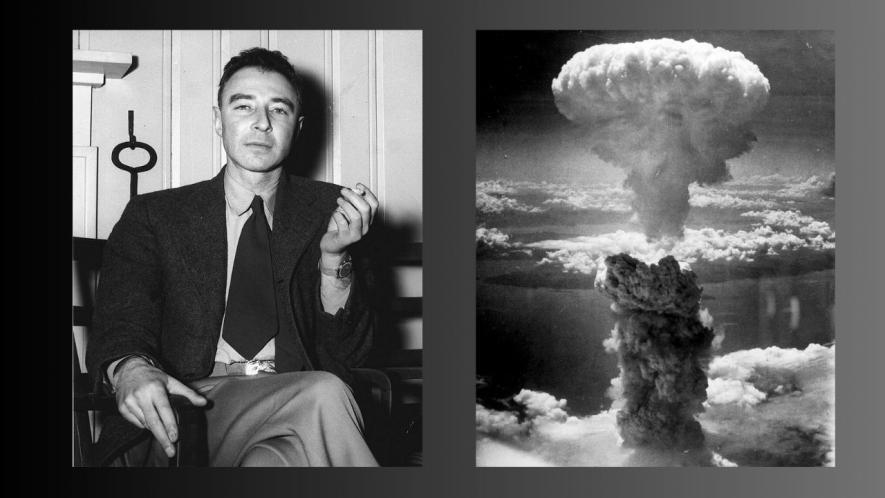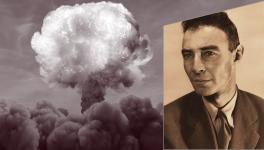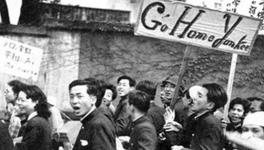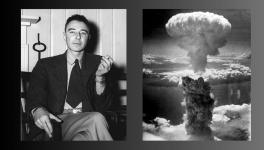Fact and Fiction About Oppenheimer and Decision to Atomic Bomb Japan—Part 1

Several articles in the recent past, especially after the release of the movie “Oppenheimer”, had no qualms in holding scientist J Robert Oppenheimer primarily responsible for the decision to drop atomic bombs on Japan.
Oppenheimer has been accused of being a “conscious proponent of mass murder” (1 August) and a “war criminal” (3 August). He is accused of the “glorification of mass murder” (4 August) and of being among those “F***ing men... [who] built the hydrogen bomb.” (14 August).
Another accusation is that Oppenheimer’s membership of the Scientific Panel of the Interim Committee “would, eventually, convince President Harry Truman to use the bombs” (22 August). Suvrat Raju also wrote in The Wire on 6 August, an article titled, “Oppenheimer Did Not Stop at Building a Nuclear Bomb. He Also Pushed for its Use in Japan.”
There are numerous other mostly impressionistic articles which have indulged in the character assassination of Oppenheimer without providing a shred of evidence to back the wild allegations.
Incidentally, Raju, writing in The Wire, is one of the few who made even a passing reference to the role of James Byrnes—the real villain responsible for the atomic bombing of Hiroshima and Nagasaki.
It is highly regrettable that most of those who hold Oppenheimer accountable for the atomic bombings are totally oblivious of James Byrnes’ machinations in this regard.
My attempt here is to debunk these baseless charges against Oppenheimer through this response to Raju’s article, which has at least attempted to base the accusations against Oppenheimer on what seemingly appears as documentary evidence.
Unfortunately, Raju—with whom I have much in common otherwise—has drawn conclusions, I am afraid, without examining all the facts relating to the grotesque event.
The article begins with the claim:
“Oppenheimer is a well-made movie... However... Oppenheimer did not restrict himself to the problem of building a nuclear bomb. He advocated for its use in Japan, over other possible options, and played a role in planning its delivery so that it would take as many lives as possible”.
Oppenheimer, the movie, is certainly well-made. It is also a fact that the three-hour movie could not have covered all aspects relating to and arising from the decision to use atomic bombs on Japan. Of course, the movie could certainly have made the views of Leo Szilard and Niels Bohr much more explicit. Moreover, the movie completely omitted any reference to the critical change that took place on 12 April 1945: The sudden demise of President Franklin Roosevelt—a noted liberal—and the ascendancy of then vice-president Harry Truman—an arch-conservative—as the US president.
Most commentators fail to note this ominous development and then make factually incorrect comments. Raju is a victim of such an oversight. On the face of it, the charges levelled against Oppenheimer may appear true, but there was always an unseen hand behind the political decision-making process at the Manhattan Project.
As a letter to the editor, in response to one of the latest articles on the subject in the Bulletin of the Atomic Scientists, notes:
“Oppenheimer was at the mercy of an out-of-control military led by General Groves and Curtis Lemay. He was already under investigation for espionage during the development of the bomb and under tremendous pressure to produce. He may have felt the need to prove his loyalty to protect himself and his family.”
The documents Oppenheimer purportedly acquiesced with or affixed his signature to, as Raju mentions, namely, a “meeting’s summary” and “recommendations on the immediate use of nuclear weapons”, are dated 12 May 1945 and 16 June 1945, respectively, i.e., nearly a month or two months after president Truman and his chief advisor James Byrnes (subsequently the US Secretary of State) had concluded that “the bomb might well put us in a position to dictate our own terms at the end of the war.”[i]
Their decision was to use atomic bombs as soon as they were ready. [But the constraint was the time needed for processing an adequate quantity of uranium and plutonium to the requisite grade.] It may be noted that the war in Europe had ended on 8 May 1945 with the surrender of Germany.
However, according to Oppenheimer:
“...the deadline never changed. It was as soon as possible... After the collapse of Germany, we [the scientists] understood that it was important to get this [the atom bomb] ready for the war in Japan.”[ii]
It is, therefore, more than evident that Oppenheimer was merely following orders and providing technical answers to technical questions. He was by no stretch of the imagination empowered to make political decisions. Oppenheimer was forced to acquiesce to decisions made elsewhere since he was in no position to express dissent.
The Notes of the Interim Committee Meeting held on 1 June 1945 make it absolutely clear who the real decision-maker was in this regard:
“Mr Byrnes recommended, and the Committee agreed, that the Secretary of War should be advised that, while recognizing that the final selection of the target was essentially a military decision, the present view of the Committee was that the bomb should be used against Japan as soon as possible; that it be used on a war plant surrounded by workers’ homes; and that it be used without prior warning.” [pp.8-9]
Who was James Byrnes? How did he become all-powerful? What factors were behind the crucial change on 12 April 1945?
Rightists Take Over US Leadership
The new US president, Harry S. Truman, who replaced President Roosevelt, represented that section of the Democratic Party—the right-wing—which had consistently opposed cooperation with the Soviet Union.
Recall that when nearly four years earlier, on June 22, 1941, Nazi Germany declared war on the Soviet Union, Truman’s reaction was as follows:
“If we see that Germany is winning the war, we ought to help Russia, and if Russia is winning, we ought to help Germany, and that way, let them kill as many as possible...”[iii]
It is also interesting that for the 1944 US Presidential election, Truman secured the nomination as the vice-presidential candidate of the Democratic Party, in place of the incumbent Henry Wallace, after a bitterly fought contest—a contest that almost split the party. Robert Garson, who made a detailed study of the inner-party struggle in the Democratic Party during that period, has pointed out:
“Although he was the bete noire of the South, Wallace was the hero of the urban coalition of the North. Liberals respected his sense of vision. His dream of a postwar America that would dedicate itself to the elimination of poverty, injustice, and racism endeared him to many workers and to the struggling youths of the black ghettos. Except for Roosevelt himself, Wallace was the chief personification of the New Deal... He was, consequently, a sitting target for dissident southerners*.... Well before the [Democratic Party’s 1944 National] convention, southern leaders had planned to unite in their opposition to Wallace and to replace him with an acceptable southerner.”[iv]
[* Extreme conservative sections within the Democratic Party, mostly from the southern states of the USA.]
The contention of these right-wing leaders was that:
“...never before in the history of our party had the position of Vice- President on the Democratic ticket been more important than it is this year.”[v]
This was due to the fact that Franklin Roosevelt, who had been nominated for the post of President for an unprecedented fourth term, was not keeping well. His health was causing concern, and it was rumoured that he would not live long enough to complete his term. Therefore, the right-wingers applied tremendous pressure and, in what was supposed to be a compromise, succeeded in securing the nomination of Truman (who was technically not a southerner since he was from Missouri) for the post of Vice-president.
President Roosevelt died in the fourth month of his fourth term, and Truman took over. But soon after Truman assumed office, he came out in his true colours:
“His first move was to summon James F. Byrnes to Washington to become secretary of state [from 3 July 1945]... Byrnes, of course, had been the South’s principal choice for vice-president in 1944 [but because his name was staunchly opposed by the Liberals, the so-called compromise was worked out]; now, one year later, he was appointed the key architect of American foreign policy—and was also next in line to the presidency. Many former cohorts of Roosevelt left the cabinet to be replaced by Truman’s choices.... Southerners were confident that this rapid change of personnel boded well for the reinstatement of more conservative policies...”[vi]
(Emphases added.)
This domination by the “southerners” was ominous of what was to follow.
The author is joint secretary of the Delhi Science Forum and author of The Meaning of Hiroshima Nagasaki: The Decision to Use Atomic Bombs on Japan & Its Implications for Humankind, 1990. The views are personal. (The second part of this article is to follow.)
References
[i] Harry S. Truman, “Memoirs Vol.I: Years of Decisions”, Doubleday & Company, Inc., New York, 1955, p.87
Get the latest reports & analysis with people's perspective on Protests, movements & deep analytical videos, discussions of the current affairs in your Telegram app. Subscribe to NewsClick's Telegram channel & get Real-Time updates on stories, as they get published on our website.
























